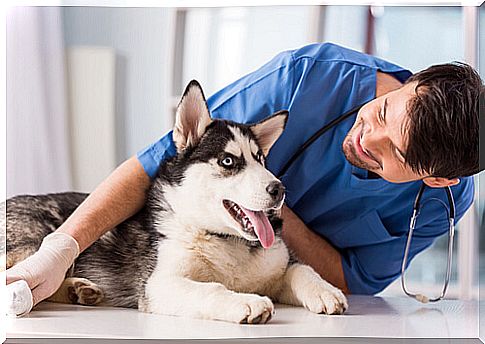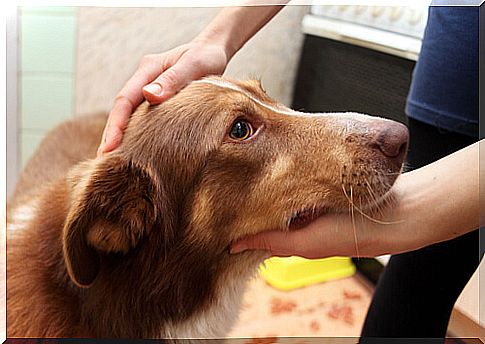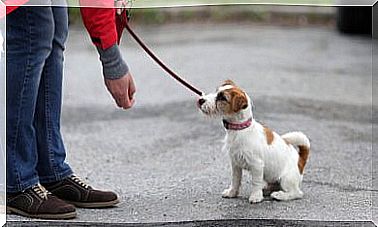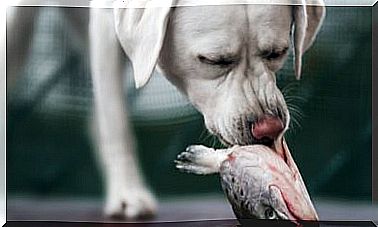What To Do If Your Dog Has Seizures

Seizures are the result of disorders in the nervous system, which manifest with motor impairment and, in some cases, with loss of consciousness. When a dog has seizures, an immediate medical check-up is essential.
The causes of seizures can be diverse. A common mistake is to believe that it is a disease: a seizure is a symptom of a pathology or condition.
Therefore, the specialist’s diagnosis will indicate the origin and the appropriate treatment when a dog has seizures. At the time of a crisis, the owner must know what to do, and the health and improvement of the animal will depend on it. Here are some tips.
Why does a dog have seizures
The causes can have different origins, from traumatic events to congenital. Also the action of external agents, such as medications, can cause seizures.

- If the animal has received a strong blow to the head, this can cause seizures. In these cases, the possible cause of the seizure should be indicated to the veterinarian.
It is very likely that the specialist will decide to do a cranioencephalic study to evaluate possible injuries.
- Metabolic disorders Some metabolic diseases are associated with seizures, and also certain hormonal disorders; for example, hepatitis, hypoglycemia and hypocalcemia.
The same happens with pathologies associated with the thyroid.
- Infections or poisoning. When the dog has seizures it is important to rule out any infection. One of them may be meningitis.
Drug poisoning can also cause seizures.
- Breast tumors in dogs, degenerative diseases or other diseases are pathologies that must be diagnosed by the specialist. Especially, and with more reason, when the dog has seizures.
In general, brain tumors are associated with seizures, and also some chronic degenerative diseases.
- Seizures can also be due to congenital causes or heredity. Some breeds are prone to seizures, not least because they have brain malformations.
As examples, there are the Chihuahua, Yorkshire and the Poodle. Hydrocephalus, which can lead to epilepsy, is common in these breeds.
What to do when a dog has seizures
Before the crisis
In the presence of a seizure, it is important to immediately attend the specialist. The same should be done in case of suspicion of a nervous disorder.
For example, a preventive way is to take the dog for a checkup when it has received a strong trauma, even if there has been no seizure.
Seizures occur in three phases:
- The first can be mistaken for an emotional reaction. The dog becomes more nervous, shaky and with excessive salivation; This condition can last up to two days and appear in lapses.
- The following phases are associated with the crisis. When the dog has seizures, the muscles contract and the body jerks involuntarily. In some cases, you even lose consciousness.
- Finally, the dog gradually recovers, possibly a bit confused and disoriented.
In the middle of the crisis
- When our pet has seizures, it is important to remain calm. Objects that could harm the animal during the crisis should be kept away.
- The dog should not be held, grabbed, or picked up. On the contrary, pillows can be placed around him to prevent injuries.
- Sound or light stimuli can further disturb the dog and should therefore be avoided. It is also not recommended to tuck him in or offer water or food.
- Observing the animal is an important aspect. It is necessary to avoid that his head leans back and sticks his tongue, because this action could choke him.

After the crisis
- Once the epilepsy crisis passes, the veterinarian should be called immediately, who will give the following indications.
- The specialist may ask how many times did the crisis occur? How long did it last? What happened before the crisis?
- The vet will also need to know if the dog is under any medical treatment, or if it has received any head trauma.
- While the animal recovers, it is important to give it space to breathe. It is also necessary to ensure that he regains consciousness, if he has lost it. Under no circumstances should medications be given without medical supervision or authorization.
- The specialist’s diagnosis will indicate the causes and treatment. In general, seizures are associated with epilepsy, but a dog that has seizures does not necessarily have to be epileptic.
It might interest you …
Main image source: eltpics










